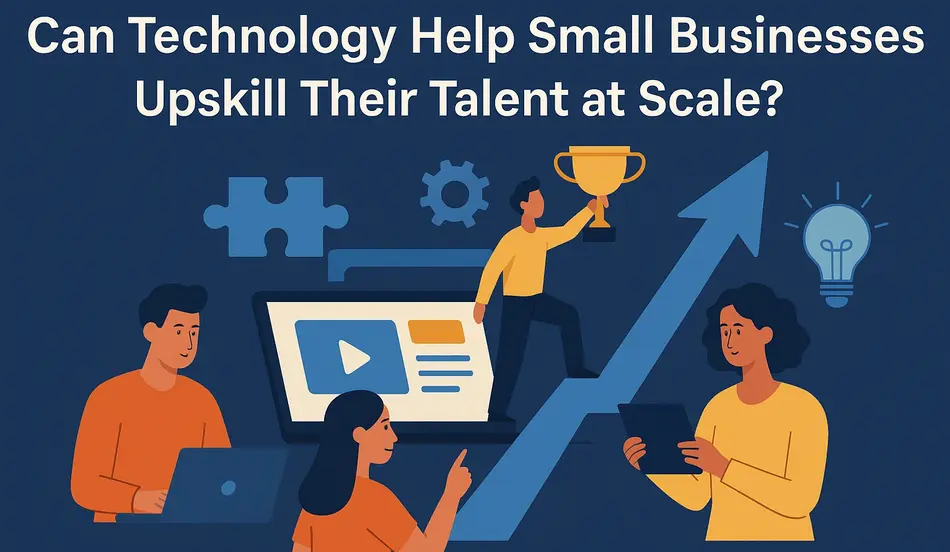Nearly half of the American workforce is interested in upskilling or is looking for upskilling opportunities. In a world that’s rapidly advancing, the ability for employees to grow alongside technology is imperative.
As technology transforms productivity, more small businesses need workers who are capable of not only adapting to industry changes but also growing alongside these innovations becomes increasingly important.
According to McKinsey data, as much as 42% of US employees are interested in upskilling or are actively searching for upskilling opportunities. Among younger workers aged between 18 to 24, this figure rises to 63%, while 53% of those aged 25 to 34 have a desire to upskill their capabilities at work.
We’re also seeing major US corporations invest heavily in upskilling their staff. In 2023, accountancy firm PwC announced that it would commit $1 billion over three years to expand and scale its artificial intelligence capabilities while upskilling its workforce of 370,000 employees.
As AI continues to transform how businesses operate, the need for upskilling to retain a competitive edge over other industry players is becoming stronger. Fortunately, technology is helping to make upskilling more accessible for small businesses to help grow the competencies of their workforce at scale.

Personalized Training
One of the most effective tools at the disposal of small businesses when it comes to upskilling is a functional Learning Management System (LMS).
These tools can help you to arrange your learning materials, track the progress of employees, and even implement microlearning and gamification tools to create a more engaging experience.
Coupled with the actionable feedback these LMS tools can provide employers, it’s entirely possible to make data-based changes to learning modules, all at a budget outlay that suits the specific needs and objectives of your small business.
Artificial intelligence is enhancing the capabilities of LMS, helping to create more personalized learning experiences by analyzing the strengths and perceived skill gaps among participants.
In practice, this means that training programs can lean on AI to analyze data to determine the skills that are most needed on an individual level, as well as those that the learner already has. This means that staff can undergo a bespoke training experience that doesn’t waste time on needless areas of focus.
Using artificial intelligence to deliver personalized training can help small businesses to get the best out of their upskilling efforts without having time wasted retreading on competencies that have already been learned.
Recruiting Receptive Talent
While businesses have become accustomed to recruiting talent for training opportunities and internal roles based on their qualifications or relevant work history, reskilled workers can be left out of the reckoning due to the way that they’ve built their competencies.
Utilizing an intelligent skill taxonomy can help to overcome these challenges, empowering businesses to consider their enrollment policies in a way that better manages the transition from one skill set to another.
We’re seeing evidence of this working through an AI program developed by Novartis, which predicts, matches, and generates offers for roles based on the employee’s perceived skills and goals.
Successful upskilling and reskilling can only occur if businesses create an adaptive enrollment environment for employees. By recruiting receptive talent, more workers can benefit from possessing the right motivations and personality traits to flourish in upskilling initiatives.
Encourage Knowledge Sharing
The potential use cases for virtual meeting rooms in the post-pandemic landscape are continuing to grow, and they could form an excellent platform for knowledge sharing throughout your organization’s industry.
Whether you invite non profit experts to discuss relevant topics for your small business or create digital networking opportunities between your organization and others in industries you’re interested in expanding into, the opportunity to allow workers to share their insights and learn new information is invaluable to your upskilling potential.
Knowledge sharing can come in all shapes and sizes, and you could even seek out renowned industry figures to give virtual talks to your staff for an engaging discussion or invite celebrities to perform their own motivational speaking.
Allocating Time to Training
Automation tools make it easier for small businesses to enable their workers to spend time on their personal development without running the risk of losing valuable productivity hours on repetitive tasks.
The ability of artificial intelligence and automation technology to support staff in manual processes such as data entry, team management, task delegation, and administrative tasks like running a payroll and generating pay stubs means that businesses are free to allocate a greater level of focus on staff training and development.
This means that your LMS modules don’t have to feel rushed or your employees distracted by their daily tasks.
Embracing the Upskilling Revolution
Emerging technologies are transforming the way small businesses operate. While these innovations are presenting new challenges for upskilling employees to be ready for these changes, they’re also empowering employers to streamline the way their staff learn new skills.
From personalized training modules to assessing employee receptiveness to new learning opportunities, there’s no shortage of ways that technology is improving the receptiveness of small businesses to upskilling.
The age of upskilling is upon us, and it’s transforming how small businesses are retaining their best talent.




